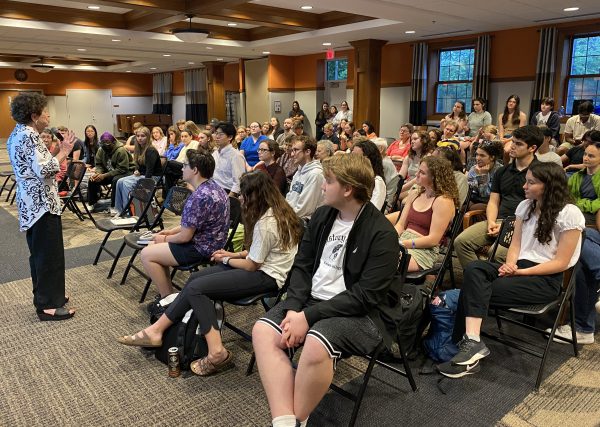


Holocaust survivor Irene Miller visited Kalamazoo College students, faculty and staff Thursday at the Hicks Student Center to talk about some of the grim details behind one of the darkest periods of history.
“I am one of the 10% of Jewish children who survived the Holocaust,” she said. “Most of the survivors are gone now. Among the six million Jews who were killed were a million and a half children. Though I can tell you only about my survival journey, those of us fortunate enough to be left alive became the voices of those who didn’t live to tell their story.”
Miller discussed her memoir, Into No Man’s Land, which was published in 2010 after she came to grips with a need to tell her family’s story. Born in Warsaw, Miller—with her sister and parents—attempted to escape to the Soviet Union after the German invasion of Poland in World War II.
Miller remembers her family’s apartment building being repeatedly hit with bombs night after night as the Nazis entered her city.



“I was too high up to see the faces of the Nazi soldiers,” she said. “They were filling the width of the street, but strangely, I could see the reflection of shiny boots pounding the pavement. You know how long ago that happened, and to you young people, that happened before your parents were born and probably before most of your grandparents were born. Yet there are still some sounds, smells and aromas to which I have emotions. One is the sound of low-flying planes. Another is a rhythmic pounding on a hard surface. I hear it and I tighten up.”
Miller’s father crossed the border from Poland into Russia while securing their legal entry through an immigrant camp near Bialystok. Her mother was captured by Germans but managed to escape and then reunite with her family. The family later was deported to a Siberian labor camp, suffering severe hunger and hardships every day.
“In Siberia, in wintertime, there are only about three hours of daylight,” she said. “Temperatures would drop to 50 below and lower. If a bird for some reason couldn’t fly away on time, it would freeze to a tree like a lump of ice. We didn’t have clothing for that kind of climate. If you were outside with any part of your skin exposed, it didn’t take more than a minute or two to get frost bite.”
In 1942, after the Soviet Union’s recognition of the Polish government in exile, the Millers were released and sent to Uzbekistan, only to find no work and no food. Miller’s parents put her and her sister in an orphanage for Jewish children for a better chance of their survival. After the war, Miller returned to Poland and stayed in a Krakow orphanage until age 17, eventually immigrating to Israel and then the United States.



Miller now is a retired health care executive who has worked as a hospital administrator, planner and developer at Group Health Plan of Southeastern Michigan. She also was the director of mental health for Livingston County, Michigan, the director of the psychiatric division at Detroit Osteopathic Hospital, and the director of treatment centers for drug-addicted and dual-diagnosed women and their children at the Detroit Medical Center. Separately, she served in Washington, D.C., on an advisory committee for issues related to drug addiction in women and children and was a teacher in Israel.
Currently, Miller is a docent and speaker for the Detroit Institute of Arts, a courts mediator, and she serves on the Board of Directors of the American Jewish Committee. She has been a speaker at large events across the U.S. and Canada with appearances before professional conferences, military groups, NASA Space Center, labor unions, churches, schools and more.
Miller was interviewed and recorded for Steven Spielberg’s Visual History Foundation and participated in Shoah Ambassadors, a November 2021 PBS movie. The December 2016 PBS documentary Irene: Child of the Holocaust discussed her experiences with near-starvation in Siberia. Yet despite her experiences and reflections, Miller’s biggest cautionary message for students about the Holocaust isn’t necessarily the importance of remembering it. Instead, she implores her audiences to watch for signs that something as devastating to humanity could happen again.
“My most important mission in life is to show what hate and prejudice did and what hate and prejudice can do again with a democracy falling from within unless we learn from it,” she said.
Learn more about Miller at her website.



